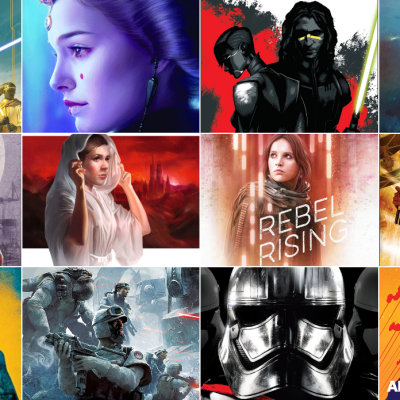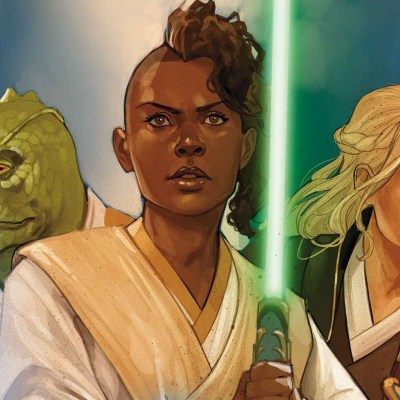Star Wars Victory’s Price Review: Alphabet Squadron 3
Victory's Price concludes Alexander Freed's Alphabet Squadron trilogy, one of the best Star Wars book series to date.

The Alphabet Squadron series has always been about secrets. Since it began in June 2019, the three-book series has essentially filled the role of the old X-Wing novels, following a mismatched group of pilots in the years after Return of the Jedi. Alongside the dogfights were the people hiding histories and motives from one another and from themselves. It’s some of the most complex and interesting work in Star Wars right now. What does a book ostensibly about heroism have to say about people governed by misunderstandings, anxieties, and happenstance? Quite a bit. The third book wraps up the series with a multi-layered, mostly satisfying finale.
Former Imperial pilot Yrica Quell has switched sides several times. Now she’s undercover with her former Imperial squad, and so deep under that her New Republic teammates think she’s betrayed them. Her old mentor Soran Keize has become even more bloodthirsty than the rest of the Imperial remnant in his effort to continue the Emperor’s Operation Cinder — planetary destruction, but make it slower and messier than a Death Star laser. Alphabet Squadron chases Keize’s Shadow Wing across the galaxy to a confrontation that will determine how the New Republic handles ex-Imperials going forward.
Stream your Star Wars favorites right here!
Those stakes — not only Quell’s loyalty, but what to do about anyone who served the Empire — are a brilliant way to make Quell’s story relevant to the whole galaxy. Author Alexander Freed brings video game writing experience to creating the best kind of science fiction adventure ending: one that depends on character growth and themes as much as on laser blasts. It’s a grueling but entertaining look at the complexities of war.
Book three does break some of the perfect immersion of the first two books, with some secrets withheld when the characters know them full well. After the close perspectives in the first two installments, it was jarring and felt artificial to have some key information — for example, about what exactly Quell was trying to do in the finale of Shadow Fall and the beginning of Victory’s Price — left out. But overall the character work remains strong.
Precision and specificity mesh well with broad metaphor. Pilot Wyl Lark’s efforts to reach across enemy lines to form an alliance never really result in a miraculous change of heart, but they do provide entertainment for his own side. Wyl’s arc always felt to me indicative of parasocial relationships, of trying to get to know someone you never really will. And he doesn’t. But along the way, his efforts make real connections between him and the people already on his own side.
While the second book created a strong friendship between the pilots Nath and Wyl, book three focuses on everyone else. Quell, Chaos, Kairos, and Hera all get their due. An adventure to a strange jungle world becomes an odyssey with three women bubbling with possibility for either connection or ruin.
Fans looking for more of Star Wars Rebels‘ Hera Syndulla will find a lot of her here. The multi-talented and soft-hearted general doesn’t exactly have an arc in this book; she’s a supporting character. But she’s deftly drawn in a way that both captures her other appearances and feels like she’s been carrying even more of the weight of the war.
While I found Soran Keize, the Imperial commander, to be a weak point in Shadow Fall, his perspective and motivation are much clearer now. The ideological clashes between him and Quell are effectively load-bearing, as is their affection; Keize doesn’t stop being Quell’s mentor even as they move further and further to opposite sides of the war.
It’s not all delicate character interactions, though. Action scenes feel pleasantly suited to either the Star Wars films or video games. The author creates vivid starfighter scenes in part by drawing directly on famous film shots like the opening of the climactic battle in Return of the Jedi. But it doesn’t feel like pastiche or repetition. Instead, it’s alchemy. Sound, physicality, and banter all come together to create a vivid battle worthy of the movies. (Sound is also used in a fun way with the chapter and section titles, all of which are in-universe song titles.)
So, how does Victory’s Price work as the conclusion to a trilogy? The final act is a careful balance between personal and political. Quell and the rest of the Empire have done terrible things: what does a just government do with them? What about a group of people who are trying blindly to make a just government that we know will fall to the First Order in a matter of decades? Victory’s Price even has characters dramatize a common thread in Star Wars discourse, that of whether Luke was right to mourn Darth Vader after all the evil he had committed. Where Luke found Anakin worth saving, this pilot finds the idea of mourning Vader grotesque.
The whole finale is a balancing act: between action and character, between the personal and the political, between epic redemption and damnation, and the more mundane reality in between. In the back half of the book, a rhythm starts on both sides of the war: we have to fight for our people. Be true to one another. An echo: The Rise of Skywalker‘s ideologically empty there are more of us. After Wyl’s arc argued in favor of the morale of the group, Freed doesn’t stop with the simple platitude of we’re right because we’re together. After all, that’s Keize’s argument, too. The conversations between the characters are also conversations about Star Wars‘ morality as a whole, and while sometimes the conclusions feel uncertain, we’ve had three books to explore what exactly is the content of Quell’s uncertainty.
In a book about people searching for unspeakable catharsis, the finale offers mercy that comes in unexpected ways. The book seems sometimes not to deliver on what was promised, to swerve at the last minute like a pilot who seemed to be on a collision course. That perfect tone wavers. But I’ll be fascinated to see what the rest of the fandom thinks. Entertaining, fascinating, at times slow but always thoughtful, Victory’s Price is one of the best Star Wars books to date.



